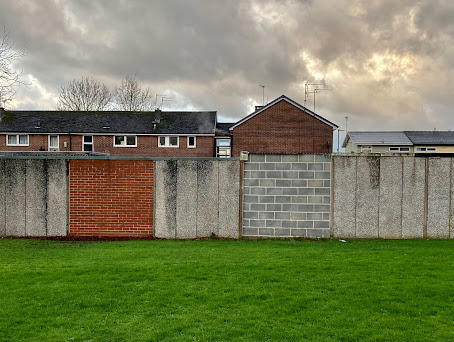I have always been really interested in walls and windows that have been bricked up or blocked. It is a recurring theme in my work and I collect them with my eyes in my daily life. I always stop and carefully think about the reasons for permanently blocking an opening, is it the window tax, the view, security? I like how they look and this is usually enough. I know in a symbolic way they mean something, there is a sadness about most of them. This symbolism is not what I'm interested in, the things I like about blocked up windows sits behind the symbolism.
I gave a lecture in Bristol to some MA students and I said I was interested in meaning but meaning that sits behind spoken or text based language. One of the students asked me for an example of this so I gave him the finger. I was in some ways referencing Wittgenstein's later work around private language but also pointing out that I couldn't really talk or write about meaning that was beyond spoken or written language without creating a circular paradox. I think the students liked my arrogance but also were frustrated I couldn't be of more use to them. The picture above says something that I could never put into language, it represents a moment and a space and a noticing. It isn't something that requires autonomy or a transformation into something else but for me at least it does act as a reminder of how a practice flows in and out of a life. If I was still reading Whitehead it would be a prehension but I've forgotten what this means in all its complexities.
I am about to start to read about artists residencies. I have done a little of this but it was never an avenue of research that held me for long. In writing my literature review I am trying as much as possible to adopt the writing style of analytical philosophy. I'm not really sure what this is but I will define it here as getting as close in language to explaining an idea as is possible and to write for an audience who may not have a grounding in any of the ideas or philosophies I am trying to write about and with. I have just finished reading a book called Radical Hope by Jonathan Lear, this book is written in this way. It tells stories and builds arguments and keeps bringing you back to the central flow of an idea. This is the type of writing I aspire to for my first chapter although through necessity it will require a smaller area of focus.
The sky was red this morning and a storm is coming, for the third day I got soaking wet walking the dog. The arthritis in my little fingers reminded me of how our bodies don't ignore the seasons even if we try our best to push on as normal. I met Tim at the top path just by the grave of Disney Tummy, Tim represent the Jungian wise man of this blog. He is constructed here in my minds eye from the best bits of himself. The sounding board of the cemetery where only Tim and the dead seem to pay attention to my mumbling. Today I made the proposition of artists residency as assemblage. This is to take from Delueze/Guattari the concept of agencement and think residency through it. Like our walk the conversation went around in a large circle skirting the periphery and the main issue which is of course death. My question to Tim put as simply as I can is.- If we conceive as the artists in residence as a manifestation or rather a becoming of a more than human assemblage that pays attention to its singular nature what the fuck difference does it make?
As it stands an artist in residence is an assemblage of artist, place, practice, traditions, materials, art works, people, time, process, politics, the law, religion, history, language and and and. The residency becomes, there is an enunciation across time and space, something comes to matter. This is what a residency 'is' and although some of these words are not words I would of previously used I would have felt the meaning behind them and lived them as ethos, tradition and position while in residence. I think most artists would look at this recipe of reduced parts and recognise the singularity of a residency and all the expectations that go with this. My question to Tim was not about seeing the existing state of things as an assemblage, putting a name to something that was already there or seeing something in a new way. My question was about the potentials of a residency becoming assemblage within a new conceptual framework. Initially I thought this was about de-materializing the art object and reorientation to pure process referencing John Dewey and Lucy Lipard yet this feels like retrofitting the abstract machine of capture that constituted the idea of residency before it became a body without organs. The proposition for residency held as assemblage where the ideas, practice and individual romanticized vision of the artists sublimate is the place I think residency as assemblage could pass through. Deleuze liked Lewis Carol as he felt the writing took you through and across surfaces, down rabbit holes inside skins at different scales, he liked Artaud because of his body without organs and his drug fueled chaotic journeys. Tim had to go home to try and catch up with an assemblage of paperwork and forgotten jobs that really needed doing. We avoided some rabbit holes and I think agreed that most people live life as assemblages and singularities without questioning or refuting this position. So we were both unclear what fucking difference thinking through Deleuzian assemblage made to anything outside a very narrow world of the academy.

No comments:
Post a Comment